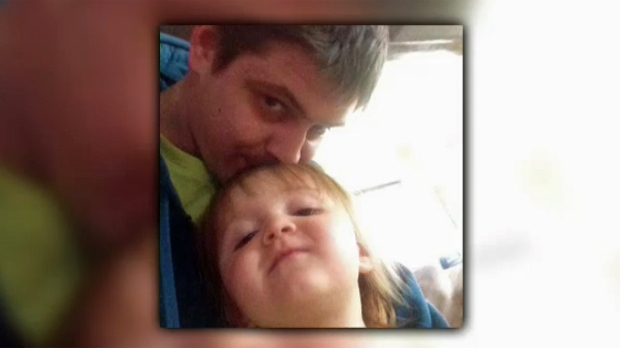Family of Terry Blanchette, Hailey Dunbar-Blanchette ‘disappointed’ in parole eligibility change
 Hailey Dunbar-Blanchette and Terry Blanchette
Hailey Dunbar-Blanchette and Terry Blanchette
A woman related to two Alberta murder victims is speaking out in the wake of a decision that transformed the parole eligibility for Canada’s multiple killers.
Derek Saretzky was convicted of three counts of first-degree murder in the 2015 deaths of Terry Blanchette and his two-year-old daughter Hailey Dunbar-Blanchette in Blairmore, Alta., as well as Hanne Meketech in Coleman, Alta.
He was given a life sentence with no chance of parole for 75 years, but a decision from Alberta’s Court of Appeal decided that he would be eligible for parole in 25 years.
Before the change, Saretzky would have been 97 before he could apply for parole. Now he will be 47.
In a statement to CTV News, Terry’s sister and Hailey’s aunt said she is “very disappointed” in the decision.
“What was done to my two-year-old niece and my brother and Hanne was cruel and unusual,” said Amanda Blanchette DeSteur. “Why should people who do horrendous things like this be allowed to have hope for a life again? Bring back capital punishment and forget their hope.”
The Supreme Court’s decision centred Alexandre Bissonnette, the gunman who killed six worshippers at a mosque in Quebec City in 2017 and was initially sentenced to life in prison with no parole for 40 years.
Bissonette's sentence has been changed to allow him to be eligible for parole in 25 years.
However, a Supreme Court of Canada decision determined life sentences with no real chance of parole are "cruel and unusual” punishment.
Similar decisions were made in two other multiple murder cases in Alberta – Edward Downey, who killed Calgary mother Sarah Baillie and her daughter Taliyah Marsman, and Jason Klaus and Joshua Frank, who murdered three members of Klaus’ family in 2013.
CTVNews.ca Top Stories

Halifax police say Walmart employee's death isn't suspicious; no details released
Police in Halifax say the death of a Walmart employee who was found inside an oven in the store last month is not suspicious, but they are refusing to release any additional details.
Canada Post, union to meet mediator Monday in effort to end strike
Canada Post and the Canadian Union of Postal Workers (CUPW) are meeting with a special mediator for the first time Monday to continue talks as they enter the fourth day of a national strike.
Parts of Canada will see up to 30 centimetres of snow. Here's where
Canadians are bracing for a chilly start to the week as snowfall and other wintry conditions are expected to make landfall across western and eastern provinces.
9 injured, including 2 critically, after stolen vehicle collides with TTC bus in Toronto: police
Nine people were injured, including two critically, after a stolen vehicle collided with a TTC bus in North York early Monday morning, Toronto police say.
Taylor Swift Eras Tour: Ticket scam west of Toronto costs 40 people more than $70K
Dozens of people in Halton Region are out tens of thousands of dollars after buying fake or nonexistent tickets to Taylor Swift’s Eras Tour dates in Toronto, police say.
'Saving lives is not controversial': B.C. doctors set up 'unsanctioned' overdose prevention sites at hospitals
A group of physicians are setting up unofficial overdose prevention sites outside two Vancouver Island hospitals Monday, aiming to help people struggling with addiction – while also sending a message to the government.
Israeli airstrike hits central Beirut near key government buildings and embassies
An Israeli airstrike late Monday slammed into a densely populated residential area in Lebanon's capital close to the UN headquarters, Parliament, the prime minister's office and several embassies.
Tropicana fans are ditching the brand after a bottle redesign
Tropicana customers are in revolt over an orange juice bottle redesign. Again.
Moscow warns U.S. over allowing Ukraine to hit Russian soil with longer-range weapons
The Kremlin warned Monday that President Joe Biden's decision to let Ukraine strike targets inside Russia with U.S.-supplied longer-range missiles adds "fuel to the fire" of the war and would escalate international tensions even higher.































